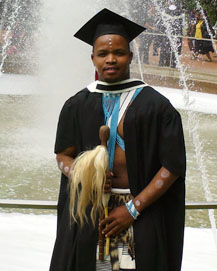 |
Sibongile Potelwa
Photo: Supplied
6 September 2012 |
Sibongile Potelwa, a postgraduate student at our university, has been nominated for the 2012 South African Traditional Music Achievement (SATMA) Award in the category “Best Praise Singer”.
Sibongile, who studies Financial Economics & Investment, has been a busy student on the Bloemfontein Campus, with a list of achievements that continues to grow. In his first year, he received a certificate for being on the list of the Top 10 First Years in academics at Villa Bravado residence and he was inducted as a member of the Golden Key International Honour Society in his second year. He was also a tutor in Accounting and Economics for first-year students. This year, Sibongile became a Student Ambassador for the university in the Office of the Rector.
Sibongile performs under the stage name “Sijadu” and has been involved in praise poetry since the age of 11. He lists his recent performance at the Charlotte Maxeke Memorial Lecture, where he performed in front of President Jacob Zuma and other cabinet ministers, as one of his favourites.
“I would like to appeal to the university community, the Free State Province and South Africa at large to vote for me. This award absolutely belongs to Kovsies and therefore I believe that we cannot let the opportunity pass us by,” says Sijadu.
The SATMA Awards take place on 27 October 2012 in East London in the Eastern Cape. Voting lines will be open until 26 October. People can vote by sending a sms with the following information: SATMA, SIJADU, BEST PRAISE SINGER to 34066. Each sms costs R2.